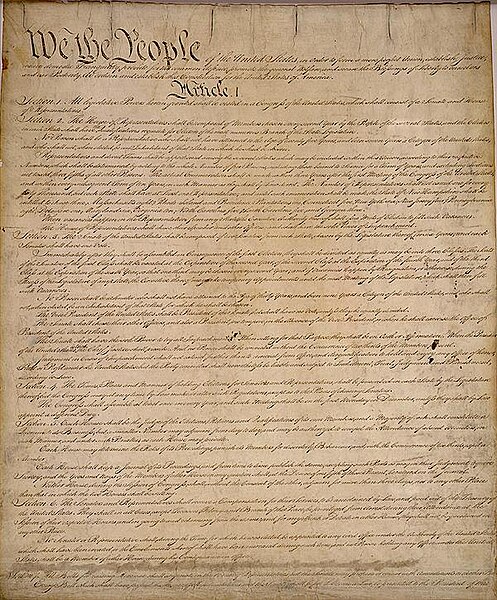
by Wilton H. Strickland
More than a thousand legal scholars recently signed a letter criticizing the Trump administration for sparking a “constitutional crisis” by issuing a number of controversial executive orders. I have received invitations to sign letters of this sort, and hardly a day goes by when I do not see a post on social media by someone in the legal community who accuses the Trump administration of posing a grave threat to the Constitution. Federal judges across the land have joined this chorus by leaping into action and issuing multiple injunctions against executive orders, echoing the assertion that the orders are unconstitutional.
All of this baffles me. The Constitution has been in crisis for a long time, beset by flagrant abuses of power that have grown so frequent as to become commonplace, yet the legal community never raised the hue and cry that we are witnessing now. I have written about these abuses on a number of occasions for the past twenty years, sometimes in articles and other times in books. There is no need to reprint all that work here. What I can do is summarize a few of these constitutional abuses to shed light on why the legal community’s sudden (and selective) outrage is too little, too late.
A prime example is the president’s usurpation of the war power, which the Constitution entrusts to Congress while instructing the president to act as commander-in-chief of the armed forces if Congress declares it. Congress has not declared war since World War II. In the eight decades since then, however, America has gone to war numerous times, resulting in the terrifying loss of blood and treasure at the behest of a single man – precisely what the founders sought to avoid. It was only a few years after World War II when President Harry Truman dramatically seized the war power by declaring a “police action” in Korea under the auspices of the United Nations, circumventing a supine Congress that could not muster a serious objection. As time went by, Congress degraded itself even further by explicitly surrendering its war power so that the president could wield it at his own discretion, such as with the Gulf of Tonkin resolution that paved the way for the Vietnam War, or the Authorization for Use of Military Force (AUMF) resolution regarding terrorism that allowed George W. Bush and his successors to initiate war wherever and whenever they might choose. Presidents also have a habit of launching small-scale warfare in places such as Grenada, Panama, Serbia, Libya, Syria, and now Yemen, but it remains unilateral and unconstitutional warfare all the same. The Obama administration announced that the entire globe is a terrorist battlefield and that the president may kill anyone, anywhere, at any time, even American citizens. This goes beyond abusing the war power and signals the destruction of the Fifth Amendment as well, which protects Americans from being deprived by the federal government of life, liberty, or property without due process of law. The Trump administration shows no sign of disagreeing with these grave abuses and has conducted unilateral acts of war abroad, yet this is not what draws the legal community’s scorn. Instead, the legal community condemns executive orders that curtail discretionary spending, or that impose tariffs, or that seek to preserve women’s sports, or that define citizenship in a manner more faithful to the Fourteenth Amendment, or that restrict membership in the armed forces. It’s embarrassing, frankly.
Congress has been no slouch when it comes to violating the Constitution. Surrendering the war power is merely one example. The other violations occur whenever Congress legislates or spends in a manner beyond the few powers enumerated in Article I, Section 8, which is pretty much whenever Congress is in session. All of the following are abuses of power that started during the last century but do not seem to trouble the legal community:
- The war on drugs. Recall that we amended the Constitution to authorize alcohol prohibition in the early twentieth century, and we amended it again to repeal that prohibition. No such amendment authorizes the federal government to prohibit the possession or consumption of narcotics, which are matters left to the States by the Tenth Amendment.
- Employment and workplace regulations. The manner in which a private business runs its internal affairs is nowhere to be found in Article I, Section 8, and thus is reserved to the States. Yet mountains of federal legislation and accompanying regulations dictate hiring and firing practices, safety procedures, handicap access, and the like. These measures are sometimes touted as protecting “civil rights,” yet civil rights apply against the government rather than against private citizens.
- “Mandatory” spending such as Social Security, Medicare, Medicaid, and other variants of federal assistance that are treated as part of the budget on an ongoing and automatic basis, and which consume the majority of the federal budget. This has become such a sacred cow that people seldom dare to question it, yet it remains beyond what the Constitution authorizes Congress to do. The States are free to experiment with these types of assistance programs, a lawful approach that would also avoid the problem of unsustainable debt that now hangs like an albatross around the neck of the entire nation.
- “Discretionary” spending that is debated from one Congress to the next, but which runs the gamut across all walks of life and far beyond the humble provisions of Article I, Section 8. The arts. Schools and universities. Farm subsidies and price supports. Alternative energy. Media campaigns to discourage drinking, smoking, or other unhealthy habits. Public-works projects (such as the ones that President Madison vetoed as beyond Congress’s enumerated powers). The list goes on and on. These countless endeavors, however noble or useful, are none of the federal government’s business and were not regarded as such for most of our history. Congress also uses discretionary spending to bribe us into accepting more control than allowed by Article I, Section 8, compounding the abuse (just one example is how Congress sets the minimum age to consume alcohol and tobacco — something it has no authority to do — by threatening to withhold funds). The legal community voices no objection to these abuses of the spending power, but rather objects to the Trump administration’s reduction of spending without obtaining congressional approval. Apparently, the unlawful reduction of spending is a much greater problem than the unlawful spending itself. It is a world turned upside down.
- The delegation of power to bureaucracies. There are so many rules and regulations – tens of thousands of pages in the Federal Register – that Congress long ago gave up trying to create them. Instead, Congress has outsourced its power to federal agencies and thus abdicated its sole right and responsibility to legislate. This represents another alteration of the constitutional blueprint without benefit of an amendment. With faceless, unelected bureaucrats perpetually churning out rules carrying nationwide impact, it is easy to conclude that we have taxation, regulation, fines, and punishment without representation.
For its part, the Supreme Court has spent the last ninety years rubber-stamping these abuses, offering one tortured rationalization after another for expanding federal power. We are to believe, for example, that an undeclared war is legally valid and can justify a military draft. We are to believe that the power to regulate interstate commerce – i.e., to protect the free flow of goods and services – allows Congress to obstruct commerce and to control activity that is neither interstate nor commercial, simply because the activity could theoretically have an effect on interstate commerce if allowed to proliferate. We are to believe that the power to spend taxpayer money is unrestricted by the enumerated powers in Article I, Section 8, or curtailed by the Tenth Amendment. And we are to believe that it’s perfectly fine for unelected bureaucrats to create laws if Congress offers guidelines to do so. The legal community does not criticize this madcap jurisprudence, but rather celebrates it or slavishly accepts it as “the law of the land” (which it is not).
At the same time it was turning a blind eye to the President and Congress, the Court began attacking the States and stripping them of their broad police power, which has had devastating consequences on communities’ ability to tackle unique problems and experiment with solutions. The pretext is the Fourteenth Amendment, which became part of the Constitution after the Civil War and whose key provisions had the narrow goal of ensuring that all rights enjoyed by white citizens were also available to the former slaves. The Supreme Court emphasized this narrow goal shortly after the Amendment’s passage, refusing in the Slaughter-House Cases to strike down a generic state law because doing so would transform the Court into a “perpetual censor” of the States and effectively destroy our federal system. In the twentieth century, however, the Court abandoned this restraint and appointed itself as a super-legislature whose political and philosophical views trump everyone else’s. The Constitution was designed to protect States so that they and their citizens could figure out for themselves how best to live; now, however, the Supreme Court and the lower federal courts use the Constitution as a sword rather than a shield, slicing away at the fabric of our lives for subjective and unpredictable reasons completely divorced from the constitutional text. Our ability to experiment with political solutions in our communities is all but extinct, since any disgruntled Tom, Dick, or Harry can run to a nearby courthouse and nullify the wishes of his neighbors on a host of subjects concerning public health, safety, and morals (which are the domain of the States per the Tenth Amendment). This goes a long way toward explaining why American life is not what it used to be. Once again, the legal community has no problem with this, but rather celebrates it.
In short, the legal community does not have a leg to stand on anymore. For almost a century, it has passively allowed or actively supported abuses of power that have plunged us into undeclared wars; have grossly expanded the scope of federal control over our communities and our daily lives; and have saddled us with unpayable debts. To paraphrase Apocalypse Now, accusing this presidential administration of violating the Constitution is like handing out speeding tickets at the Indy 500. I am not alarmed at what might happen under the Trump administration. I am alarmed at what already happened long before Trump assumed office and what will continue to happen long after he has departed.


